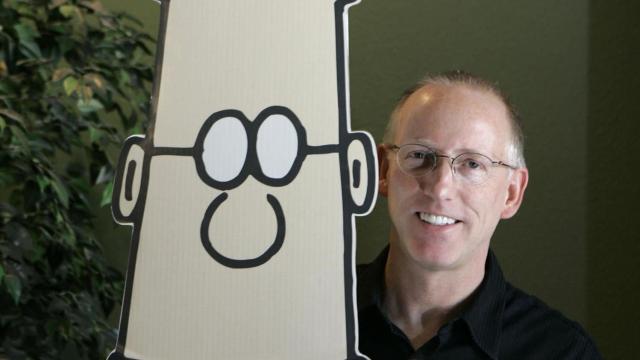Watch out, climate-conscious businesses: The guy who draws Dilbert is out to get you.
Scott Adams, the creator of the long-running comic strip Dilbert, said in a YouTube video posted last week that he would be setting out to “take a shot at” or “destroy” the business practice of environmental social governance using his comic about a dude who works in a cubicle. Scary!
Environmental social governance, more commonly referred to by its acronym ESG, is a set of criteria intended to guide investors and businesses into making socially conscious decisions and investments. Climate change has formed a key component of many ESG doctrines, as financial institutions have recognised — at least on paper — the importance of making investments that don’t fuck up the planet.
The concept has picked up speed over the past year as a new bogeyman for fearmongering from the right-wing, who have branded it as a form of “woke capitalism” and have attacked companies like BlackRock for engaging with the concept of investing responsibly. Several red states across the country now have laws on the books that restrict the state from engaging with banks or other financial entities that practice some form of ESG policies. Late last month, the Heritage Foundation, a famous right-wing think tank with deep financial ties to the Koch brothers, launched a campaign against the concept of ESG, calling the practice “the Left’s latest political tool to use businesses and financial institutions to advance progressive ideology in American society.”
Now, it seems, Scott Adams has decided to weigh in. Recent comics have made blundering passes at the idea of increasing diversity at big businesses, like this one from Tuesday. The yuks don’t end there. On Monday he posted this one, which manages to hit both the Gender and Climate alarm bells.
Wow, these are… so funny. Real cutting-edge stuff there, Scott.
The usual right-wing bozos have been lapping up Adams’ new tack. “Congrats to @BlackRock and Larry Fink for appearing in today’s Dilbert,” Republican Sen. Tom Cotton tweeted last week with a link to a cartoon about the definition of ESG.
To be fair, there are plenty of critiques to be had with the way ESG currently operates: Obviously, there are ways to put money toward a social problem that don’t actually go very far in solving said problem. The SEC in May proposed rules to ensure that ESG claims made by U.S. funds were actually legit and to increase disclosure around those funds. But the idea of companies putting their money where their mouth is on important social issues is overall a good idea. When it comes to climate, especially, investing in companies and funds that don’t pollute the planet so much is not only responsible but also financially beneficial in the long run.
What’s more, right-wing forces have actually opposed the new SEC rules, with several Republican attorneys general filing comments with the SEC last month challenging the rules. The Biden administration is trying to “radically transform the SEC and other agencies run by unelected bureaucrats and make them champions of climate change, regardless of what those agencies’ functions are,” West Virginia Attorney General Patrick Morrisey, who led the challenge, told E&E News.
For his part, Adams is clearly approaching his ESG critique from a bad-faith angle. He’s long expressed scepticism around climate science, authoring several strips on the subject and challenging his Twitter audience in 2016 to “find a scientist — just one — who says the climate prediction models are credible” — a proposal that is rooted in a fundamental and deliberate misinterpretation of how scientific modelling works.
In the video posted last week, Adams encourages people to share his strips and for employees to send comics to their bosses to help take down the big bad ESG machine.
“It should start to become known that Dilbert thinks it’s ridiculous and then people who also think it’s ridiculous will start retweeting it,” he said. “And then the boss who’s in charge of it will start to get these sent to him by email or printed out and slipped under the office door. Mockery is very powerful and mockery, in theory, could dismantle this.”
The idea that heads of major investment firms in charge of billions of dollars will be swayed by a couple printouts of an extremely dated cartoon that recycles its punchlines from right-wing Twitter really speaks to Adams’ idea of his own self-importance. If you slip a Dilbert comic under your boss’s door, please film it for me. That would actually be funny.
